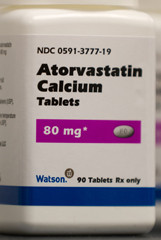Consumers could save as generic Lipitor hits the market

For anyone who needs a statin drug to lower cholesterol, yesterday marked the beginning of a long “black Friday” sale. The patent on Lipitor, the world’s best-selling brand name prescription drug, expired on November 30th. Two less expensive generic versions of the drug, called atorvastatin (uh-TORE-vuh-sta-tin), should be in pharmacies today.
One generic, curiously enough, is being manufactured by Pfizer, the company that makes Lipitor, but it will be distributed by New Jersey-based Watson Pharmaceuticals. The other generic, approved yesterday by the FDA, is from India-based Ranbaxy Laboratories. Other companies may jump in with generic versions of atorvastatin later. Meanwhile, Pfizer will continue making, marketing, and selling brand name Lipitor.
In addition to atorvastatin, six other statins are currently available in the United States. Three are available as both generic and brand-name products: lovastatin (Mevacor, generic), pravastatin (Pravachol, generic), and simvastatin (Zocor, generic). The other three are brand name only: fluvastatin (Lescol), pitavastatin (Livalo), and rosuvastatin (Crestor).
Generic versus brand-name drugs
Generic drugs are chemical clones of their brand-name counterparts. By law, a generic drug must:
- contain the same active ingredients as the brand-name drug
- be identical in strength, dosage form, and administration
- work the same way in the body (be bioequivalent)
- meet the same standards for identity, strength, purity, and quality
- be made by the same rules the FDA has set for the brand-name drug.
The main physical differences between a generic drug and its brand-name version are the shape or color of the medication and the inactive ingredients. Generics contain different coloring agents, binders, and preservatives than the brand-name drug. These might make a difference in how the drug works for you, but that’s uncommon.
The other big difference is cost. Paying for Lipitor out of pocket costs up to $160 a month. Generic atorvastatin will cost about half that amount. If you get your medication through an insurer or pharmacy benefit plan, switching from a brand-name drug to a generic version usually lowers your copay. It might not with Lipitor, at least for a while. As the New York Times reports, Pfizer is making deals with insurers and pharmacy benefit managers to price brand-name Lipitor at or under the generic alternatives, to keep sales of Lipitor as strong as possible for as long as possible.
Should you switch?
If you take Lipitor and generic atorvastatin will save you some money, it makes sense to switch to the generic medication. If you are taking another generic statin, “I don’t think there is any reason to switch from one statin to another as long as you are reaching your LDL (bad) cholesterol goal and are not having side effects,” says Dr. Thomas Lee, editor in chief of the Harvard Heart Letter.
About the Author

Patrick J. Skerrett, Former Executive Editor, Harvard Health Publishing
Disclaimer:
As a service to our readers, Harvard Health Publishing provides access to our library of archived content. Please note the date of last review or update on all articles.
No content on this site, regardless of date, should ever be used as a substitute for direct medical advice from your doctor or other qualified clinician.











.jpg)

